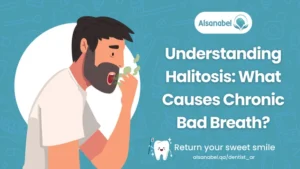
Halitosis, commonly known as chronic bad breath, can be an embarrassing and frustrating problem. It affects millions of people worldwide and can have a significant impact on self-confidence and social interactions. While occasional bad breath is normal, persistent halitosis may indicate underlying health issues that need attention.
Many individuals seek ways to treat halitosis effectively, whether through bad breath remedies or professional treatments. Fortunately, various solutions can help eliminate bad breath and prevent it from returning. This article explores the best treatment for bad breath, the causes of chronic halitosis, and practical methods for achieving long-lasting fresh breath.
Understanding Halitosis: What Causes Chronic Bad Breath?
Before exploring how to cure chronic halitosis, it is essential to understand what causes it in the first place. Several factors contribute to persistent bad breath, ranging from poor oral hygiene to underlying medical conditions.

1. Poor Oral Hygiene
Neglecting proper oral care allows plaque buildup, bacteria growth, and food particles to accumulate, leading to chronic halitosis.
- Inadequate brushing and flossing leave debris trapped between teeth.
- Bacteria on the tongue produce foul-smelling sulfur compounds.
- Not cleaning dentures or braces properly can also cause bad breath.
2. Dry Mouth (Xerostomia)
Saliva plays a crucial role in washing away bacteria and food particles. A lack of saliva allows odor-causing bacteria to thrive.
- Dehydration, certain medications, and mouth breathing can cause dry mouth.
- Drinking more water and chewing sugar-free gum can help stimulate saliva production.
3. Diet and Food Choices
Certain foods contribute to chronic bad breath due to their strong odors or effect on digestion.
- Garlic, onions, coffee, and spicy foods leave lingering odors in the mouth.
- Dairy products and sugary foods promote bacterial growth, worsening bad breath.
4. Gum Disease and Infections
Periodontal disease is a major cause of persistent halitosis.
- Infected gums harbor harmful bacteria, leading to bad breath.
- If left untreated, gum disease can cause tooth loss and chronic oral infections.
5. Smoking and Tobacco Use
Tobacco products leave a strong odor in the mouth and contribute to gum disease, dry mouth, and plaque buildup.
- Smoking reduces saliva production, worsening bad breath.
- Quitting tobacco use significantly improves oral and overall health.
6. Underlying Health Conditions
Can certain diseases cause halitosis?
Yes, chronic halitosis may indicate systemic health issues, including:
- Sinus infections and postnasal drip, where mucus buildup causes an unpleasant odor.
- Gastroesophageal reflux disease (GERD), allowing stomach acids to reach the mouth.
- Diabetes, as high ketone levels lead to a distinct, fruity-smelling breath.
- Kidney and liver diseases, which cause metabolic waste buildup, leading to bad breath.
Best Treatment for Bad Breath: How to Cure Chronic Halitosis
If you are wondering how to cure chronic halitosis, several effective treatments can help eliminate bad breath and prevent it from returning.
1. Improve Oral Hygiene Practices
Brushing and flossing daily is the most effective way to treat halitosis and maintain fresh breath.
- Brush twice a day with fluoride toothpaste to remove bacteria and plaque.
- Floss once daily to eliminate food particles between teeth.
- Use a tongue scraper to clean bacteria off the tongue.
2. Use Antibacterial Mouthwash
Mouthwash helps kill bacteria and neutralize odors.
- Look for mouthwashes with chlorhexidine, cetylpyridinium chloride, or essential oils.
- Avoid alcohol-based mouthwashes, as they can dry out the mouth.
3. Stay Hydrated and Stimulate Saliva Production
Drinking water helps flush away bacteria and food particles, preventing dry mouth.
- Chew sugar-free gum or mints to stimulate saliva flow.
- Consume water-rich foods like cucumbers, celery, and apples.
4. Adjust Your Diet for Fresher Breath
Certain foods naturally freshen breath and prevent bacterial growth.
How can I naturally freshen my breath?
- Eat parsley, mint, or basil, which contain chlorophyll to neutralize odors.
- Consume probiotic-rich foods like yogurt and kefir to balance oral bacteria.
- Increase fiber intake with raw vegetables and fruits to clean teeth naturally.
5. Quit Smoking and Avoid Tobacco Products
Smoking cessation is one of the best treatments for bad breath as it prevents dry mouth, gum disease, and persistent odor.
- Using nicotine gum or patches can assist in quitting.
- Seeking professional smoking cessation programs can provide additional support.
6. Treat Underlying Medical Conditions
If persistent halitosis does not improve with oral care, an underlying health issue may be responsible.
- Visit a dentist to check for gum disease, cavities, or infections.
- Consult a doctor if bad breath is linked to GERD, diabetes, or sinus infections.
How Do Dentists Treat Halitosis?
A dentist will evaluate oral health and recommend treatments based on the underlying cause.
1. Professional Dental Cleaning
- Removes plaque and tartar buildup that contributes to bad breath.
- Prevents gum disease and bacterial growth.
2. Scaling and Root Planing (Deep Cleaning)
- Treats periodontal disease, a major cause of chronic halitosis.
- Eliminates bacteria from deep pockets between the teeth and gums.
3. Prescribing Medicated Mouthwash or Antibiotics
- Dentists may recommend chlorhexidine mouthwash for bacterial infections.
- In some cases, oral antibiotics are prescribed to treat severe gum disease.
4. Addressing Dry Mouth and Saliva Issues
- Dentists may recommend saliva substitutes or prescription rinses.
- Using sugar-free gum and lozenges can help increase saliva production.
What Causes Persistent Bad Breath Even After Brushing?
What causes persistent bad breath even after brushing?
Even with proper brushing, bad breath may persist due to:
- Bacteria on the tongue – A coated tongue harbors odor-causing bacteria.
- Gum disease – Infection below the gumline can cause chronic bad breath.
- Dry mouth – Lack of saliva prevents natural cleansing of bacteria.
- Digestive issues – Acid reflux and gut imbalances can lead to bad breath.
- Dietary factors – Some foods leave lingering odors despite brushing.
To combat persistent halitosis, use a tongue scraper, floss daily, stay hydrated, and consult a dentist if the problem continues.
Frequently Asked Questions About Treating Halitosis

1. What is the best treatment for chronic bad breath?
The best treatment for bad breath includes improving oral hygiene, using antibacterial mouthwash, staying hydrated, and treating underlying medical conditions.
2. How do dentists treat halitosis?
Dentists treat halitosis with professional cleanings, deep scaling, medicated mouthwashes, and gum disease treatments.
3. What causes persistent bad breath even after brushing?
Causes include gum disease, dry mouth, bacteria on the tongue, acid reflux, and poor diet choices.
4. How can I naturally freshen my breath?
Natural remedies include chewing parsley or mint, drinking water, using coconut oil pulling, and consuming probiotic-rich foods.
5. Can certain diseases cause halitosis?
Yes, diabetes, GERD, sinus infections, kidney disease, and liver problems can contribute to bad breath.
Knowing how to treat halitosis is essential for maintaining oral health and confidence. By using bad breath remedies, improving oral hygiene, staying hydrated, and addressing medical conditions, individuals can effectively eliminate chronic halitosis. Whether through home care or professional treatments, adopting the best treatment for bad breath ensures long-lasting freshness and a healthier smile.
%20(2).jpg)

